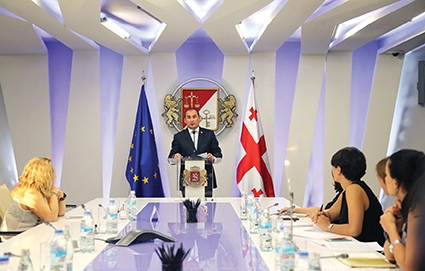Finance Ministry: Moody’s Upgrades Georgia’s Ratings
Georgia’s Minister of Finance and Vice-Premier Dimitry Kumsishvili stated that for the first time since 2007, international rating company Moody’s has upgraded Georgia's ratings to Ba2 from Ba3, adding that the outlook remains at stable.
“Moody’s Ba2 is the highest level taken by Georgia in the ratings of other companies,” the Minister stated at a special press-conference, saying the reason for improvement was that Georgia's economy proved resilient to the significant economic, financial and exchange rate shock in the region in 2014-16.
Kumsishvili stated that in the given period, Georgia’s GDP growth averaged 3.4% at a time when many of its neighbors were in or close to recession.
He said that Moody’s attributed this resilience to effective macroeconomic policy management and strong banking supervision that allowed banks to continue to finance the economy.
“The rating company also underlines that financial institutions in Georgia are strong,” the Minister added.
The Investor’s Service of Moody’s upgraded the Government of Georgia's local and foreign currency issuer ratings on September 11.
Georgia's foreign currency senior unsecured ratings have also been upgraded to Ba2 from Ba3.
The local-currency bond and deposit ceilings were raised to Baa1 from Baa3.
The foreign currency bond ceiling was raised to Baa3 from Ba1 and the foreign currency bank deposit ceiling was raised to Ba3 from B1. In addition, the short-term foreign-currency bond ceiling was raised to P-3 from Not Prime and the short-term foreign currency deposit ceiling was maintained at Not Prime.
“We expect Georgia's economy to strengthen and its resilience to shocks to continue to be enhanced as ongoing measures to diversify and reform the economy bear fruit,” the statement of the company reads.
Moody’s also mentioned the ongoing process of diversification of trade and investment relationships, including through the Association Agreement (AA) and Deep and Comprehensive Free Trade Agreement (DCFTA) with the European Union (EU).
“These agreements will provide Georgia with technical and financial support to further develop its already strong institutions and further deepen political and economic relations. Closer ties and alignment with EU norms will also boost competitiveness through measures to improve customs procedures, food quality, education systems, and labor codes,” the statement reads, adding that, beyond its relations with the EU, Georgia has growing access to a diverse set of markets, through various recent and prospective trade agreements, such as those with a number of Commonwealth of Independent States members, Turkey, and potentially through the prospective free trade agreement with China.
The company added that the recent reforms in the country significantly improved financial situation.
“We also expect that past microeconomic reforms, which have helped to boost the economy's shock absorption capacity, will continue to positively affect the economy,” Moody’s added.
The statement reads that these reforms include success in reducing corruption to low levels compared with most other sovereigns and significant reductions in the number of taxes along with simplified tax administration, as well as broadening the availability of online tax payment.
Moody’s added that labor market reforms started in Georgia in the last few years, adding they ease restriction on hiring, work hours and redundancy and will also boost the potential for enhanced productivity in the economy.
“The business environment has also improved through reform of the system of licenses and permits which, for example, reduce the time to register businesses and receive permits for construction projects,” the statement reads.
Georgia’s Finance Ministry believes that the increase of Georgia’s currency issuer ratings will increase the inflow of foreign investments in the country and will serve as a signal that Georgia is a reliable country for investments.
Thea Morrison











